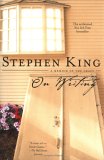Reading Guide Questions

Please be aware that this discussion guide will contain spoilers!
- Do you agree with Stephen King that the desire to write always starts with a love of reading?
- What role did Stephen King's childhood play in his evolution as a writer? Did your childhood experiences influence your desire to write?
- King was encouraged from a young age by his mother, who told him one of his boyhood stories was "good enough to be in a book." Was there someone in your life who encouraged your earliest efforts?
- At what age do you remember thinking you wanted to write? What do you remember writing when you were young?
- King's wife Tabitha is his "Ideal Reader," the one-person audience he has in mind when writing a first draft. When you write, do you envision a particular Ideal Reader? Who is that person and why?
- While King delights in the nuts-and-bolts mechanics of the writing process, he concedes that good writing involves magic as well. Do you agree with King's assertion that "while it is impossible to make a competent writer out of a bad writer, and while it is equally impossible to make a great writer out of a good one, it is possible, with lots of hard work, dedication, and timely help, to make a good writer out of a merely competent one?" To what degree can a writer be made? To what extent can writing be taught? What writerly skills do you come by naturally, and which have you had to work to acquire or improve?
- Discuss King's "toolbox" analogy. What "tools" do you find most indispensable when you write? Are there any you would add to King's toolbox?
- King believes that stories are "found things, like fossils in the ground." Discuss King's extended metaphor of "writing as excavation." Do you agree with this theory?
- According to King, good story ideas "seem to come quite literally from nowhere, sailing at you right out of the empty sky," and often don't ignite until they collide with another idea that also comes unbidden. Do you find that ideas for stories or writing projects come to you out of the blue, or do you have to search for them? What serves as the basis for most of your stories? A situation? A character? A moral dilemma? King recalls a dream that led him to the writing of his book Misery. Have you ever gotten a story idea from a dream? Discuss how you discovered your best ideas and how they evolved into finished stories.
- King describes the dangers of seeking reader response -- or "opening the door" -- too early or too frequently. At what stage in a writing project do you solicit critical feedback from others? When you do "open the door," who are the first readers you ask for advice? Why do you trust those readers and what are you looking to hear from them?
- King doesn't read in order to "study the craft" but believes that there is "a learning process going on" when he reads. Do you read books differently as a writer? Are you conscious of "the craft" as you read?
- In the first foreword to On Writing, King talks about the fact that no one ever asks popular writers about the language. Yet he cares passionately about language and about the art and craft of telling stories on paper. Do you think there is a false distinction between writers who write extraordinary sentences and writers who tell stories?
- Often, King says, "bad books have more to teach than the good ones." He believes that most writers remember the first book they put down thinking "I can do better than this." Can you remember a book that gave you that feeling? Why?
- King's self-imposed "production schedule" is 2,000 words a day and he suggests that all writers set a daily writing goal. What kind of discipline, if any, do you impose upon your own writing efforts? Do you always write at the same time of day? If so, when and why? Do you try to maintain a steady pace? Does adherence to a strict routine help your writing efforts?
- King tells a story about getting his fantasy desk, a massive oak slab that he placed in the middle of his spacious study. For six years, he sat "behind that desk either drunk or wrecked out of [his] mind." After sobering up, he replaced the desk with a smaller one that he put in a corner. "Life isn't a support system for art," he figured out. "It's the other way around." Discuss King's "revelation" and the symbolism of the placement of the desk.
Unless otherwise stated, this discussion guide is reprinted with the permission of Pocket Books.
Any page references refer to a USA edition of the book, usually the trade paperback version, and may vary in other editions.





